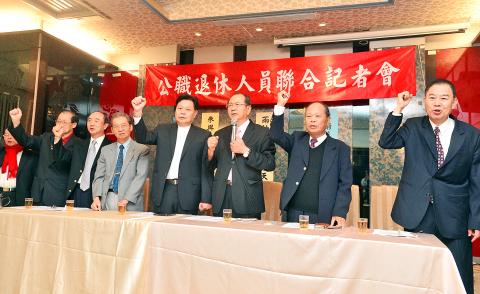|
2014 ELECTIONS: KMT pandering to retirees with bonus money: critics
YEAR-END BOOSTERS: Whether people receiving civil service or military pensions should be getting extra money has once again become a hot-button election topic
By Kan-chi-chi, Tseng Wei-chen and Jake Chung / Staff reporters, with staff writer

Retired public servants who are members of a newly formed group yesterday declare their support for Chinese Nationalist Party (KMT) Taipei mayoral candidate Sean Lien during a news conference in Taipei.
Photo: Wang Yi-sung, Taipei Times
Calls for the government to resume handing out end-of-year bonuses to retired civil servants, military personnel and teachers are simply an attempt by the Chinese Nationalist Party (KMT) to reinforce its voting base in the runup to the Nov. 29 nine-in-one elections, critics said yesterday.
The original Statute on Year-end Bonuses and Pension was in effect for more than four decades, costing nearly NT$20 billion (US$651 million) per year before the Democratic Progressive Party (DPP), the People First Party and the Taiwan Solidarity Union proposed an amendment in 2012 to make only those with a monthly pension of less than NT$20,000 eligible for the bonus.
The Executive Yuan said in August that that the pension cap on year-end bonuses would be increased to NT$25,000.
Pundits said the move, which would cost the government an extra NT$1 billion a year, was politically motivated.
KMT Legislator Sun Ta-chien (孫大千) recently proposed restoring year-end bonuses for all retirees, a move that could cost the government NT$20 billion — which opposition lawmakers said was further proof that the KMT is attempting to pacify its supporters.
Former national policy advisor Liu Sheng-liang (劉盛良) yesterday said the Executive Yuan announcement should be upheld or there would be widespread squabbling over the bonus issue.
Liu made the remark at an event to introduce a support group for KMT Taipei mayoral candidate Sean Lien (連勝文) made up of retired civil servants.
Former Examination Yuan secretary-general Lin Shui-chi (林水吉), initiator of the group, said that the bonus issue would impact KMT election support, adding that civil servants could not tolerate being labeled “greedy and insatiable.”
Lin said he hoped the government would consider making retirees with monthly pensions of more than NT$25,000 eligible for the year-end bonus.
There are about 440,000 retirees whose monthly pensions are more than NT$25,000 — about 85 percent of former civil servants, military personnel and educators — Lin said.
If Sun’s proposal is passed, the government’s year-end bonus expenditure is expected to increase by between NT$8 billion to NT$9 billion.
However, DPP lawmakers said that the Executive Yuan’s decision to raise the cap, leading to calls for resumption of payouts on a general basis, was essentially a bid to buy votes for the KMT using taxpayers’ money.
DPP Legislator Gao Jyh-peng (高志鵬) said that retirees with an monthly income of NT$50,000 that came solely from their pensions were being paid by tax money from families who earned much less.
Gao said the KMT was unwilling to make good on its promises on reforms on the annual funds for retired civil servants, military personnel and educators.
Retirees should not be eligible for bonuses since they have no standard to be held accountable to, DPP Legislator Lee Chun-yi (李俊俋) said.
The KMT’s “generous” usage of taxpayers’ money to please certain groups is a severe breach of the governmental system and the concept of equality, Lee said, adding that the move might also be against the Civil Servants Election and Recall Act (公務人員選舉罷免法).
source: Taipei Times
|